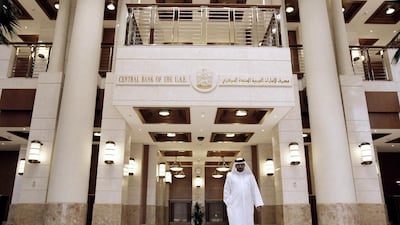The banking system in the UAE remains strong with sufficient capital base and liquidity reserves, performing efficiently last year amid favourable macro-economic conditions and a proactive fiscal strategy, according to the Central Bank of the UAE (CBUAE).
The regulatory stress test on the banking system, the second-largest in the six-member economic bloc of the GCC, showed it also remains resilient to global and regional potential macro-financial risks, the CBUAE said in its 2018 Financial Stability report.
“The UAE banking system remained adequately capitalised with capital ratios well above the minimum regulatory requirements. The funding and liquidity indicators reflected solid liquidity buffers and funding conditions with the key stable funding metrics improving further during the year,” the banking regulator noted in the report released on Monday.
“Strong financial performance and operating efficiency was reflected in rising net profits [of banks on aggregate] and lower cost-to-income ratio of the overall banking system.”
The report carried out a detailed banking system assessment, including regulatory stress testing macro-financial conditions and other aspects relevant to financial stability of the UAE. It follows the issuance of Decretal Federal Law No 14 last year regarding the central bank and financial institutions and their activities. The legislation reinforces the CBUAE's role and regulatory powers and helps it with effective oversight of the financial system in the country.
“The law further demonstrates our commitment to the stability of the financial system,” Mubarak Rashed Al Mansoori, governor of CBUAE, said in a separate statement on Monday.
“Also, in 2018, we established the Financial Stability Policy Committee, which facilitates the thorough fulfilment of this objective,” he noted.
The banking and financial system in the country faced headwinds during the three-year oil price slump that saw crude prices decline from the mid-2014 peak of $115 per barrel to below $30 per barrel in the first quarter of 2016. Banks in the country struggled to maintain lending and profitability growth as margins came under pressure on the back of a slowing economy.
The price of oil has since recovered to hover above $60 per barrel after breaching $80 mark in the last quarter of 2018. The stability in oil prices and the measures both on the federal and emirate level, including Abu Dhabi’s Dh50 billion three-year economic stimulus package, have helped maintain economic momentum. Lenders in the country reported sustained profit growth in recent quarters as margins improved.
The banking regulator projects the growth to further accelerate in 2019, reaching 2 per cent. A rise in spending on projects including preparations for the Expo 2020 in Dubai and federal government steps to stimulate private sector economy, such as relaxation of foreign ownership requirements and some visa policies, will support the economic growth, it noted.
Bank lending in 2018 improved from the a year earlier, driven by corporate sector financing dealls. Retail sector lending, however, remained stagnant and the non-performing loans ratio slightly increased during 2018 as the specific provision coverage also improved in the system. The CBUAE, also enhanced the regulatory framework for the UAE banks, including implementation of regulatory Basel III requirements on capital, risk management, controls and compliance and issuance of the IFRS 9 guidance.
To evaluate the resilience of individual banks and the banking system as a whole to potential macro-financial shocks, the CBUAE conducted its stress test. The results showed that the system remained “resilient to the considered adverse macro-financial shocks”, it noted.
Although the macro-financial outlook remains supportive of financial stability, CBUAE cautioned lenders to be “mindful of potential global and regional macro-financial risks”.

